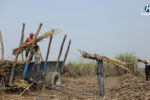KATHMANDU: Economic Digest, a daily morning email digest, is basically a relatable summation of important business news from Nepal into easy-to-understand summaries.
Gold price down by Rs 1,000 per tola
The price of gold decreased by Rs 1,000 per tola on Thursday.
According to the Federation of Nepal Gold and Silver Dealers Association (FENEGOSIDA), the precious yellow metal is being traded at Rs 75,500 per tola today.
It was priced at a fresh all-time high of Rs 76,500 per tola on Wednesday. Similarly, the price of silver has decreased by Rs 20 and is priced at Rs 900 per tola today.
Nepali banks halt gold import as demand falls
KATHMANDU: The banks of Nepal have halted imports of gold, after a notable decline in demand in the domestic market.
According to Anil Sharma, executive director of Nepal Bankers’ Association (NBA), the stock of raw gold with banks are on a high, as demand has plummeted. As per estimates, the banks hold around 450 kilograms of raw gold.
The association has decided to temporarily halt new gold imports at least until that time when the existing gold inventory is cleared. The country allows imports of raw gold only through 16 authorized banks, who later sell them to jewelers.
Mohan Kumar Bishwokarma, president of the Federation of Nepal Gold and Silver Dealers’ Association noted that trade witnessed a significant drop in demand for gold and gold jewelry since mid-December last year, due to high prices.
The customers are seen avoiding fresh buys, waiting for a correction in prices, he added. Incidentally, domestic gold prices in Nepal had hit an all-time record, surpassing Rs. 76,500 per tola on Wednesday.
The country’s jewelers noted that business has seen a decline of nearly 70% in recent months, as compared with the prior-year period. The daily gold demand at 10 kilograms in January this year, remained substantially lower from 30 kilograms during January 2019.
Currency exchange-counters deserted as demand for Indian rupees falls
With an increased supply of Indian currency, Kathmandu’s money exchangers have been hard hit in recent times. As the demand for Indian banknotes in Nepal has decreased lately, more than three dozen exchange counters in the city look deserted.
The exchange rate of the Indian rupee is Rs1.60. When demand was high, illegal changers were charging Rs1.65. Thousands of customers who hop across the Nepal-India border to Sunauli for shopping purposes reportedly even paid Rs1.67. Illegal money changers now give Rs1.57 for one Indian rupee.
Some have even stopped exchanging Indian banknotes. People who need Indian currency for the purpose of travel, health and education have been getting it through banks instead of purchasing it from money changers, media reports have said.
Meanwhile, an increase in the number of Indian gamblers at the Bhairahawa-based casinos has led to more Indian currency coming into Nepal. Smuggling of gold, pepper and betel nuts from Nepal to India has also raised the supply of Indian banknotes.
Govt to purchase security press through G2G deal despite warnings
Despite warnings from experts, the government has accelerated the process to acquire a printing facility in a government to government (G2G) deal. Experts have warned that the purchase of a printing facility worth billions of rupees without a competitive bidding process could put an additional financial burden on the country’s finances.
Moreover, there is no guarantee that the purchase made under the G2G deal would cost less than what is available in the market. Nepal Electricity Authority (NEA), a couple of years back, was dragged into a controversy when it agreed with India to purchase electric bulbs under a G2G deal only to end up canceling the deal once they found that private parties supply the same bulb for a price much lower than what was agreed in the G2G deal.
Projects linked to prosperity is govt’s priority, says Minister Nembang
Minister for Physical Infrastructures and Transport, Basanta Kumar Nembang, said that the projects linked to the nation’s prosperity were given the highest priority.
Three projects, the Olangchunggola Road, the Tamor Corridor, and the Madan Bhandari Highway hold strategic value and are, therefore, regarded as a high priority. Olangchunggola Road, which links the north and south borders of the country, underwent inspection along with the road to Pathibhara Temple.
Ratnanagar Festival to begin on Friday
The Ratnanagar Chamber of Commerce and Industries (RCCI) is organizing the 10th Ratnanagar Festival from Friday. All preparations for the event had been completed, the organizer said at a press conference. The festival is set to continue until January 21.
According to RCCI President, Rajaram Regmi, there will be representatives from Bangladesh, Pakistan, and India among other countries with their own stalls for the event. He said that the organizers of the festival have arranged various sightseeing activities that go through different tourism sites through the district by jeep and helicopter.
The expo is expected to have 500 stalls aimed at promoting tourism, art, industry, agriculture and other local products of the district.
Use of fossil fuel drops, as consumption of electricity increases
The sale growth of diesel has dialed down in the last three fiscals — from 24.4 percent in the first four months of 2017-18 to 9.5 percent in the same period of fiscal 2018-19. The growth further decreased to 1.9 percent in the first four months of this fiscal.
A major reason for this drop is the regular supply of electricity. Since 12 May 2018, several industries have stopped using diesel-powered generators to run their factories. However, factories connected to the national grid without an appropriate feeder or trunk line have been experiencing regular power tripping.
Malls, one of the biggest consumers of diesel, have also decreased the consumption of fossil fuel. Households are also using energy supplied by Nepal Electricity Authority (NEA) to cook food, as evidenced by the drop in sales growth of liquefied petroleum gas to 10.8 percent in the first four months of this fiscal.
The power supply has become less reliable since the winter season started because the distribution network of NEA is not strong enough.
According to NEA, the distribution system is overloaded and feeders are tripping because of the high demand for electricity. Transformers, especially in Kathmandu, are overloaded and distribution cables are catching fire.
Govt runs out of duty stickers for liquor, cigarette
All liquor and cigarette products require an excise duty sticker, but with the procurement process halted, stickers are fast running out.
According to the Inland Revenue Department (IRD), excise duty stickers are already in short supply. Stickers for imported liquor have already run out and the department has opted to use stickers that are meant for local products.
Tax officials said if they fail to obtain new stickers in the coming few months, they may have to either allow liquor producers and sellers to sell their products without exercise stickers or halt all sales.
The decreasing stock of stickers could also result in a halt to cigarette sales, which need a sticker too.
NT introduces 4G internet service in Jumla
Nepal Telecom’s Jumla branch has introduced 4G internet service in Jumla district. This service was launched with the use of three towers and is primarily targeted at the district headquarters, Khalanga.
Of the three towers, one is situated within the office; with the second one installed on a cliff above Acharyabada and the third one is located at Bharatibada.
The introduction of this service has also strengthened the speed of the internet in the region and this is expected to strengthen the flow of information as well.
Locals will now have easier and quicker access to information from home and abroad. Wards 3, 4 and 5 under the Guthichaur Rural Municipality currently have access to the latest version of the internet that NT provides and ward offices here use their service for all official activities.
Frequent power-trips amid govt call for more electricity use
The Government of Nepal has been encouraging the public to increase the use of electricity for daily household needs. However, the recent problem of recurring power trips has left many consumers who did opt to buy electric appliances highly disappointed.
The Nepal Electricity Authority (NEA) attributed the frequent power cuts to an overload in the system that was caused by the increased use of electric heaters and air conditioners.
According to the NEA, there has been a sudden rise in the demand for electricity over the last few weeks, especially in Kathmandu Valley. NEA spokesperson, Prabal Adhikari, added that the current problem was not due to an inconsistency in the demand and supply of electricity but rather a problem with the distribution system.
Govt preparing to bring Nepalis back from Iran, Iraq
Nepal Government is preparing to bring Nepali nationals back from Iran and Iraq in the context of escalating between the United States and Iran, officials said. Considering the situation in the Persian Gulf, the government has taken measures to rescue Nepali nationals working in Iraq and Iran in case of emergency, a media report said.
Onions worth Rs 80 mln imported from China in 5 months
Nepal imported onions from China as India imposed a ban on its exports. Official figures said over 1.8 million kilograms of onions worth Rs 80 million were imported from the northern neighbor in the last five months.
The Kalimati Fruits and Vegetables Development Committee said that onions coming from China are priced below Rs 100 in the wholesale market while they are being sold at Rs 125 in the retail market.
(Compiled and prepared by Swastik Aryal, Akash Shrestha, Nitish Lal Shrestha, Diana Zulkifli)
Economic Digest is a daily morning email digest, basically relatable summations of the most important business news and happenings from Nepal into easy-to-understand summaries. By realizing that readers are faced with a packed calendar, the Institute for Strategic and Socio-Economic Research (ISSR), Nepal’s independent think tank, and Khabarhub — Nepal popular news portal — have joined hands to disseminate news from Nepal by creating news summaries in the form of Economic Digest.









Comment